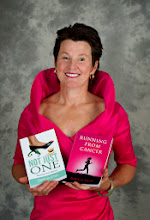Women have boobs for more reasons other than to drive men wild. Sure, they look great under a t-shirt and keep you afloat in water, but they have a much higher purpose.
Breasts have the capability to feed babies, a very important first step for newborns. It's so natural, it's up there with breathing.A child is born and the mother can pass on anti-bodies through her breast milk to protect that baby right from the beginning of time.
And, bonus, breast-feeding may also play a role in breast cancer prevention. According to the Mayo Clinic, the longer you breast-feed, the greater the protective effect.
And, bonus, breast-feeding may also play a role in breast cancer prevention. According to the Mayo Clinic, the longer you breast-feed, the greater the protective effect.
(This is a well- known fact, even back in 1984 and 1985 when my kids were born. So imagine my shock to discover I had breast cancer after having breast-fed both of them! I always figured breast cancer the one cancer I was safe from because I had done what was recommended.)
“Experts at the American Institute for Cancer Research (AICR) recommend that new mothers breastfeed their children for at least the first six months. They cite convincing evidence that this practice offers cancer protection to both mother and child.”
(Well isn’t that so “me?” I only made it to five months, with both of my children. As I recall, I was in a hurry to get back to the party, party, party. Flowers sent to me on the occasion of my daughter being born had a card in them which read: “The margaritas are chilling.”
Had I known that another four weeks would make such a difference, you can bet I would have stayed on the program!)
“According to AICR, new mothers can directly lower their own risk of both pre- and post-menopausal breast cancer by breastfeeding. And children who are breastfed are less likely to become overweight or obese, which in turn lowers their risk of several common cancers that have now been convincingly linked to excess body fat.”
"The landmark AICR report concludes with 10 recommendations for cancer prevention, one of which deals exclusively with breastfeeding," said Karen Collins, MS, RD, AICR Nutrition Advisor. "AICR is the first major cancer organization to issue an official recommendation about breastfeeding."
The full AICR recommendation reads: It's best for mothers to breastfeed exclusively for up to six months and then add other liquids and foods.
"The landmark AICR report concludes with 10 recommendations for cancer prevention, one of which deals exclusively with breastfeeding," said Karen Collins, MS, RD, AICR Nutrition Advisor. "AICR is the first major cancer organization to issue an official recommendation about breastfeeding."
The full AICR recommendation reads: It's best for mothers to breastfeed exclusively for up to six months and then add other liquids and foods.
Clinically speaking, the kind of breast cancer women get before menopause is different than the kind women get after menopause. Researchers now know that the two kinds of breast cancer have different root causes which are influenced by things like diet, body composition and physical activity in different ways.
"The fact that any single factor protects against both pre- and post-menopausal breast cancer is big news," said Collins. "The AICR expert panel looked at a host of variables associated with diet, nutrition, weight and activity, and lactation was the only one found to lower risk of breast cancer throughout a woman's life."
"The fact that any single factor protects against both pre- and post-menopausal breast cancer is big news," said Collins. "The AICR expert panel looked at a host of variables associated with diet, nutrition, weight and activity, and lactation was the only one found to lower risk of breast cancer throughout a woman's life."
How Does Breastfeeding Help Prevent Breast Cancer?
There are several theories about how breastfeeding protects you from developing breast cancer:
· Your lifetime exposure to estrogen is reduced, which decreases the possibility of developing estrogen-fueled breast cancer.
· Your hormone balances are different during lactation, resulting in fewer menstrual cycles and less estrogen exposure.
· Environmental carcinogens that are stored in fat, which makes up a great part of the breast, cannot be efficiently stored in lactating breasts.
· Breastfeeding may cause changes to breast cells that make them more resistant to cancer-related mutations.
Finding this out now reminds me of one of my favourite sayings by Catherine Aird,
“If you can’t be a good example, then you’ll just have to be a horrible warning.” And so I am.
There never are any guarantees in life. Having breast tissue puts you at risk for developing breast cancer. It’s as simple as that. Working on prevention is the key and I’ll make sure all the young girls in my life get a copy of this!
“B” is also for Berries.
Especially the darker ones like blue and blackberries, Huckle and Saskatoon berries. High in anti-oxidants to promote optimum health, they are on the top five "Super Foods" list of what you should eat to avoid diseases.
Sprinkle them on your cereal, grind them in a smoothie, eat them by the handful, make a fruit salad out of them, whatever it takes, get them into you as often as possible.
Especially the darker ones like blue and blackberries, Huckle and Saskatoon berries. High in anti-oxidants to promote optimum health, they are on the top five "Super Foods" list of what you should eat to avoid diseases.
Sprinkle them on your cereal, grind them in a smoothie, eat them by the handful, make a fruit salad out of them, whatever it takes, get them into you as often as possible.


No comments:
Post a Comment